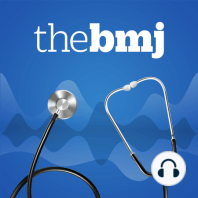19 min listen
Talk Evidence - cloning, reporting, and disseminating
FromThe BMJ Podcast
ratings:
Length:
47 minutes
Released:
May 5, 2023
Format:
Podcast episode
Description
Helen Macdonald, Juan Franco, and Joe Ross are back with our monthly update on the world of evidence based medicine.
This episode delves into new methodologies which can use observational data to emulate trial data. We discuss a new systematic review and meta-analysis of RCTs for surgical treatment of sciatica. There is elaboration and explanation of the CONSORT Harms 2022 statement - and we'll be asking if it goes far enough. Finally, the old chestnut of surrogate endpoints in cancer treatment trials - are benefits communicated to patients accurately?
Reading list;
Nirmatrelvir and risk of hospital admission or death in adults with covid-19: emulation of a randomized target trial using electronic health records - https://www.bmj.com/content/381/bmj-2022-073312
Surgical versus non-surgical treatment for sciatica
https://www.bmj.com/content/381/bmj-2022-070730
CONSORT Harms 2022 statement, explanation, and elaboration
https://www.bmj.com/content/381/bmj-2022-073725
Funders crack down on unpublished clinical trials—but is it enough?
https://www.bmj.com/content/381/bmj.p840
Communication of anticancer drug benefits and related uncertainties to patients and clinicians
https://www.bmj.com/content/380/bmj-2022-073711
This episode delves into new methodologies which can use observational data to emulate trial data. We discuss a new systematic review and meta-analysis of RCTs for surgical treatment of sciatica. There is elaboration and explanation of the CONSORT Harms 2022 statement - and we'll be asking if it goes far enough. Finally, the old chestnut of surrogate endpoints in cancer treatment trials - are benefits communicated to patients accurately?
Reading list;
Nirmatrelvir and risk of hospital admission or death in adults with covid-19: emulation of a randomized target trial using electronic health records - https://www.bmj.com/content/381/bmj-2022-073312
Surgical versus non-surgical treatment for sciatica
https://www.bmj.com/content/381/bmj-2022-070730
CONSORT Harms 2022 statement, explanation, and elaboration
https://www.bmj.com/content/381/bmj-2022-073725
Funders crack down on unpublished clinical trials—but is it enough?
https://www.bmj.com/content/381/bmj.p840
Communication of anticancer drug benefits and related uncertainties to patients and clinicians
https://www.bmj.com/content/380/bmj-2022-073711
Released:
May 5, 2023
Format:
Podcast episode
Titles in the series (100)
Think then scan, don’t scan then think: Until now, the increased risk of cancer from CT scans has been modelled from the data gathered from survivors of the Hiroshima and Nagasaki bombings. However, new BMJ research, based on a large Australian cohort, offers new evidence to support the mo... by The BMJ Podcast
